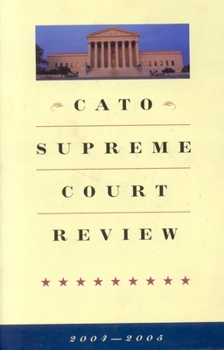Cato Supreme Court Review, 2004-2005
In this annual review, leading consitutional scholars offer a timely analysis of the most important cases from Supreme Court's 2004-2005 term from classical Madisonian perspective.
Format:Paperback
Language:English
ISBN:1930865805
ISBN13:9781930865808
Release Date:September 2005
Publisher:Cato Institute
Length:300 Pages
Weight:1.03 lbs.
Dimensions:0.8" x 6.1" x 8.9"
Customer Reviews
2 ratings
Outstanding analysis with the classical liberal perspective
Published by Thriftbooks.com User , 18 years ago
This is my second Cato Review book, and it is mostly exceptional from beginning to end. I am neither a politician nor an attorney, just someone highly interested in constitutional issues and libertarian thought. The authors found a reasonable balance between scholarly essays (loaded with footnotes) and accessible, in-depth reviews of cases and the relevant concepts. The erudition of the authors and their quality of writing is quite impressive, at least to this layman. None of the essays comes across with even a hint of mere casual thought. Rather, the authors review history, drill into the arguments from various perspectives, and speculate on future implications. For those of you who think Cato might just reflect conservative or libertarian bias, obviously a regular theme is the expansion of federal power at the expense of property rights and other classical liberal throught. Even so, the authors are not polemicists ranting from one page to another, and no justice is spared. One can predict the befuddlement over some decisions by the usual big-government suspects, yet Justice Scalia and Thomas also take their lumps. This year's book has some particularly attractive cases that caught the public's eye. My favorite chapter was on Granholm, the case on wine and favoritism for in-state producers. Author Stuart Banner (a name unfamiliar to me) covered extensive background on key points from the old days through Prohibition and beyond, much of which was new to me, and quite fascinating. Perhaps the topic was aided by its accessibility, as opposed to the finer points of some esoteric debate. The infamous Kelo case was combined with other decisions into another excellent essay on the decline of property rights. "The long history of judicial solicitude for the rights of property owners is simply discarded as unwanted baggage from our constitutional past.... Unless the Supreme Court breaks free of statist thinking about property, there is little prospect that property rights of individuals will be restored." A third widely-known decision was the Grokster case on file sharing, as the Court has struggled to refine "fair use" and copyright guidelines, mostly starting with the Betamax case. The author clearly explains why the Court has not seen the last of these cases. The book begins with a fine introductory summary of the Court's term, and a lecture by Richard Epstein on how the Progressives of the 1930s (and thereabouts) shifted constitutional thought from its original bearings to the legacy we see today. His focus is on the rise of federal power, especially through the near-limitless Commerce clause, and the decline of individual rights, with examples from labor law. The other chapters include: * Commerce power as demonstrated by the Raich marijuana case * Whether enforcement of a restraining order is a right or a benefit (Castle Rock vs. Gonzales) * Commercial speech as secondary to political speech, as demonstrated by mandatory payments to gover
Essential Reading
Published by Thriftbooks.com User , 18 years ago
There are a few books I buy with every new publication: World Almanac, The Best American Essays, Cato Handbook on Policy, Statistical Abstract of the United States, and the Cato Supreme Court Review. The one I look most forward to is the Supreme Court Review. Some people may think this book is too much a glimpse into the sausage factory, and maybe it is too esoteric for some. However, if you have any interest in the way one third of our government works then this is must read material. The Cato folks do a nice job digging into decisions made in the prior year that impact our liberty and freedom with respect to our Constitution. While all three publications have been very well done, this publication was one I was really looking forward to in light of the devastating eminent domain decision made earlier this year with Kelo v City of New London (a major blow to individual liberty and property rights). Balanced, well researched, and cited almost to a fault, this book can be easily utilized by a law student but it is written with the laymen in mind. The format is logical for each case with an introduction, background, summary of the court's opinion, analysis, and conclusion. In the 2004 - 2005 issue, the Cato Institute addresses some very important decisions: property rights, enumerated powers, the first amendment, the establishment clause, crime and punishment, regulatory issues, executive power and foreign affairs. It may seem trivial to some, even progressive, that major decisions have been made that violate our basic liberties with which the founders so clearly concerned themselves. But, I think that regardless of your political stance this is an important read. Heck, it may even stimulate you into action to take back your country. I'll admit that one can hardly be expected to take in the whole book in one sitting, but for a stimulating read even in small sections this is a great addition to any library or bookshelf. Thanks Cato Institute. Keep up the fight for individual freedom and liberty --no one in government is.





